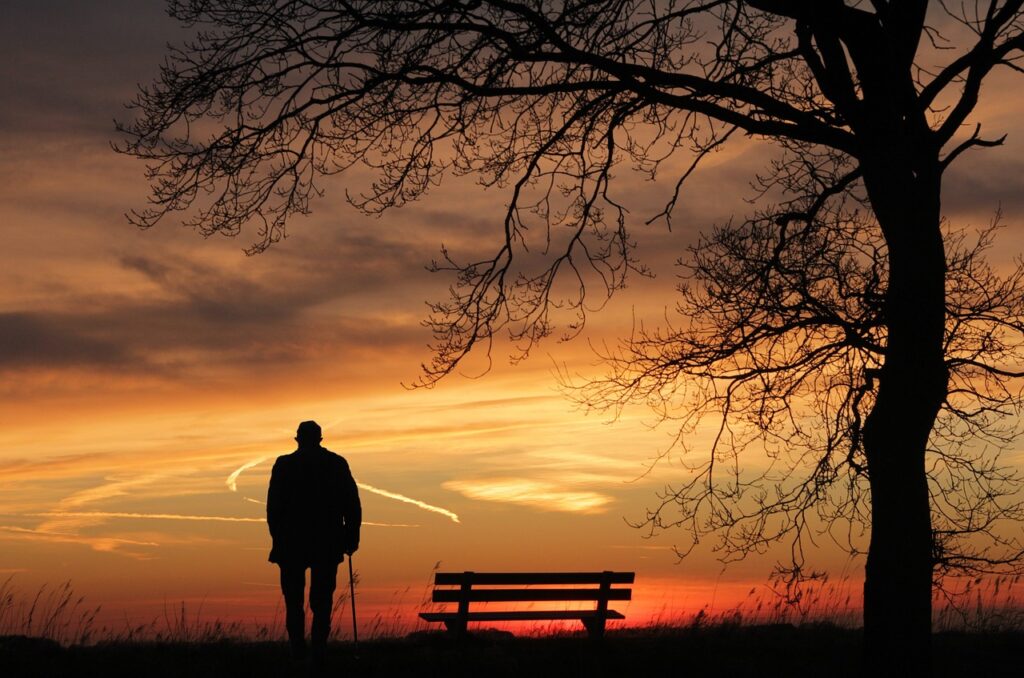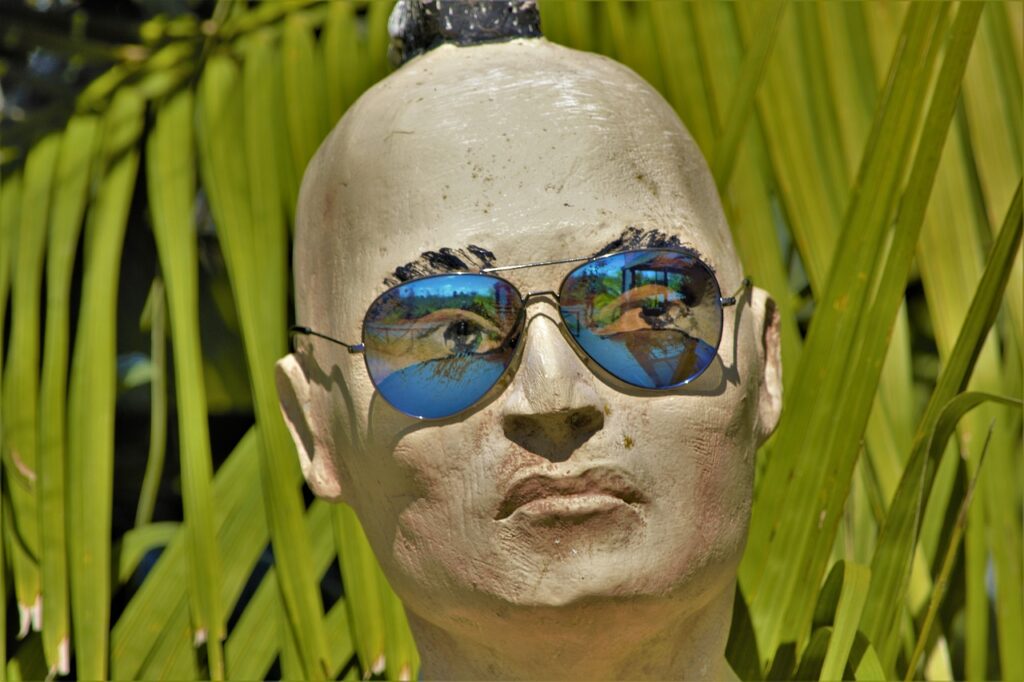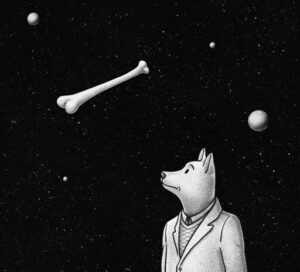If you’re single, you will “die alone.” You’ve probably heard that message, either directly or through the media. Maybe you’ve conjured up the image yourself: dying alone in a sterile hospital room, lonely and unloved, or dying alone in your apartment, days passing before anyone discovers your body. Oh, the shame, the post-mortem shame.
Years ago, I was on an online forum. I said that I wasn’t interested in getting married or having kids. Knowing me, I probably said something cynical about marriage. A newlywed man responded to my statement with an image. It showed an old man sitting on a park bench alone, his head bowed, looking despondent. The message was simple: “If you forgo marriage, you are going to end up old, lonely, defeated, and depressed.” You will die alone.
If you’ve ever been annoyed at the message that if you are single, you will “die alone,” I have some thoughts to share.

For the purposes of this article, I am going to set aside worries about aging alone. Some people worry about becoming seriously injured or sick when they’re old and having no one to take care of them. That’s a legitimate worry but a separate issue. “You will die alone” is how the warning is phrased, so we will deal with it at that level. I’m going to limit the scope to the issue of dying alone – i.e., what happens in the last few days, weeks, or months of life.
*****
Some Good News
First, I have some good news for you – there is a good chance that you will just drop dead. Before you have time to fret about dying alone, you’ll be dead, and the issue will be moot. For many, death comes swiftly and by surprise.
Heart disease is the leading cause of death. About 70% of people who have fatal heart attacks die before ever reaching the hospital, and they fall unconscious within 20 seconds (because a cardiac arrest stops blood flow to the brain). For them, the conscious experience of dying is over faster than a TV commercial. That happened to both my grandfathers and my father.
Many others die of stroke. There you are, walking along minding your own business, and suddenly you drop dead. Here one minute, gone the next. My mom died of a fatal stroke in her sleep – not a bad way to go.
We could multiply the examples. Fatal car accidents, drug overdoses, medical mistakes, wartime, murder, workplace fatalities. None of these people had a chance to fret about whether they were dying alone. Before they knew it, they were dead.
So, don’t worry. Chances are good that you will just drop dead.
*****
A Lousy Way to Make Decisions
This is a terrible way to make major life decisions like whether to pursue marriage or LTRs. Those are big questions. Your answers will shape the course of your life.
But assuming you die alone, it will be over in a few days, weeks, or maybe a couple of months. Compared to your lifespan, that is the blink of an eye. Let’s say it takes you two weeks to die. If you live to 80, two weeks comprises 0.04% of your life. That is less that one half of one-tenths of one percent of your life. Why would you make major decisions that will affect decades of your life, based on what might hypothetically occur during the last 0.04% of it?
*****
False Equivalency
I find this point kind of tedious, but I have to say it anyhow. Being single doesn’t mean you are “alone.” Just because you forgo marriage and/or perpetual couplehood doesn’t mean you have no one in your life who cares about you. We really need to stop with this false equivalency, “single = alone.” It’s foolish and simplistic.
When someone says, “You will die alone,” I immediately wonder, “Have you never heard of friends or family? Do you have no one in your life who cares about you besides your wife or girlfriend?”
I’ll use myself as an example again. As I mentioned, I almost croaked ten years ago. Now, I’m not married, I’m not in an LTR, and I’m an introvert with few close friends. Yet, when I was on the brink of death, I had people visit me in the hospital – friends, family, colleagues, even a neighbor. If I had died, I would not have died alone.
If that is true for an introvert like me, it must be true for many of you as well, who are better connected socially than I am. You won’t die alone. You have friends or family who will show up. And if you don’t have anyone in your life who cares about you, then get some (I know that’s easier said than done). You don’t need to worry about “dying alone” if you have at least one true friend.
Speaking of friends…
*****
The Speaker is Not Your Friend
When someone says that you will “die alone,” what is their intent? What is their underlying purpose in saying that?
In my opinion, it comes down to two motives:
- They want to instill fear and shame, in order to manipulate you. They want you to “get with the program,” and they are using emotional manipulation to get you to do it.
- They want to neutralize threats to their worldview and make themselves feel better. They want to reassure themselves that they are Right and you are Wrong – that their worldview (set of values, basic beliefs about how life works, source of identity, meaning and worth) is the correct one, and yours is mistaken and foolhardy. Meanwhile, they get an ego boost from patting themselves on the back for being smarter than you.
I’m not saying these people are deliberately scheming to do these things. Most people would feel embarrassed to admit these motives, even to themselves, and so they are kept unconscious. If you confront the person about them, they will deny it. “Oh no, I’m just concerned about your well-being!” Riiight….
I’ll say a bit more about the two motives.
Emotional Manipulation
Fear and shame are powerful motivators. They are used all the time to grab attention and enforce conformity. If you need evidence of that, just look at all the news articles or social media posts that use them. Part of why fear and shame are such effective control mechanisms is that they bypass higher cognitive centers (reason, judgment, planning). Not only that, they actively suppress those higher functions.
In short, fear and shame make us dumber and thus more manipulable. So beware of anyone who uses these tactics to try to persuade you. They are not appealing to reason, evidence, or logic. They are trying to emotionally manipulate you, plain and simple.
Threats to Worldview
We live in a culture where marriage has been in decline for decades, where men and women are critical not just of marriage but of modern relationships in general, and in which there is an ever-growing number of contentedly single people. If you are someone who has based his identity, meaning, purpose, and worth on these things (marriage, women’s validation, sexual-romantic relationships), then these trends can feel unsettling. It feels that way because these trends represent an implicit threat to your worldview – especially if you feel kind of shaky about your own beliefs, or you have trouble accepting other points of view.
Research shows that perceived threats to a person’s worldview activate their amygdala, which is part of the midbrain laid down millions of years ago. The amygdala handles primitive emotions like fear, anger, and the fight-or-flight response. “Worldview” sounds like a philosophical abstraction, but it’s not. This stuff strikes deep. Without a coherent worldview, we are lost, unable to decide. “Worldview” is a basket term for our basic beliefs about the world, who we are, and what matters.
“You will die alone” is the amygdala speaking. It is the “fight” option in the fight-or-flight response. It is an attack on a perceived threat to worldview. Again, this isn’t a conscious plan – it all happens below the level of awareness. By focusing on a sad, lonely image of where the single life supposedly leads, the speaker neutralizes the threat, bolsters his worldview, and calms his distress. Meanwhile, he also congratulates himself for being smarter than you.
***
Weasel Detected
Notice, please: these motives are not noble, worthy or respectable. These motives are self-serving and weaselly. The person is trying to manipulate you emotionally and to make himself feel better at your expense.

Once you see that, it gives you two advantages.
First, it helps save you energy. When they hear “you’ll die alone,” some people get hung up at the level of content — “Will I die alone?” But if you can instead step back and discern the weaselly motives underneath the message, you can sidestep fussing at the level of content.
Second, it renders the message itself impotent. Once you recognize that you are dealing with a person possessed by their Inner Weasel, the message loses impact. After all, if that is where the speaker is coming from, how seriously do you want to take what he has to say? If you know a salesman is operating from sleazy motives, would you take his pitch seriously? Once you discern the character of the messenger, it becomes easier to discount the message.
*****
Those Who Warn You Should Worry
Ironically, three-quarters of the people trying to scare you about “dying alone” will end up dealing with that same prospect themselves – and from a weaker position.
Divorce and Widowhood
We all know the divorce rates. Grey divorce (divorce among people over 55) is the fastest growing category of divorce. Grey divorces now comprises 35% of all annual divorces, per the US Census Department. To those of us in that demographic, that is a shocking statistic. When we were growing up, divorce at a late age was rare. Now it accounts for over a third of all divorces. Divorce rates do not seem to slow down as you get older.
Getting divorced is hard enough, but it can be much harder late in life. For one, you don’t have the time to recover financially like when you were younger. Say goodbye to your retirement plans. The health problems and limited energy associated with aging can also make it harder to cope with the stress and loss of divorce.
Let’s say you avoid divorce and manage to remain married. Good for you, but you still have a 50/50 chance of “dying alone.” After all, one of you has to die first. That leaves the remaining spouse to navigate the last chapter of life alone – with the added burden of grief, maybe compounded by emotionally draining years spent caretaking the spouse.
If you add those two factors together (divorce and widowhood), it means that roughly 75% of the people warning you about dying alone will face the same prospect themselves. I’m not saying they will actually “die alone” — any more than I’m saying single people will die alone. I’m saying they are now in the same position they were trying to scare you about.
Weaker Position
Well, not the “same” position. They are in a worse position – a more vulnerable, stressed, inexperienced, and unprepared position – compared to long-term, contentedly single people.
The latter have decades of experience navigating life solo. They have developed a set of external and internal skills for doing so. Long-term married or coupled people do not. They lack experience navigating life by themselves; they are accustomed to leaning on their partner. They have not developed the internal and external skills to navigate life solo (at least not to the extent that veterans of the single life have).

Moreover, most of these people are single not by choice, but single because singlehood has been forced upon them. We know that people who are single by choice experience singlehood very differently than people who are involuntarily single. So not only are these people green recruits to the single lifestyle, they have been drafted against their will. Now bereft of their partner, these people have to run the last lap of life solo, without much experience or skills at doing so, and often against their will.
Although I feel sympathy for these people, my main concern here is with single people who are the target of these “You’ll die alone” scare tactics. I want you to see that, if you are an experienced veteran of the single life, you are in a better position to face “dying alone” than the people who are trying to scare you about it. Not only will nearly three-quarters of them face the same prospect, they will do it from a much weaker, more stressed position.
Just Let Me Die in Peace
Not to pound the nail in too deep, but I even wonder about the remaining 25% — the ones who remain married and die first. From what I gather, roughly a third of long-term married people (i.e., the half who do not divorce) are genuinely happy with their partner and relationship. The other two-thirds are split between lukewarm and distinctly unhappy. They stay for other reasons – the kids, money, just wanting to be with someone, religion, habit, whatever.
Surveys of people in LTRs show the same – most of them are not particularly satisfied with their relationships. It’s easy to buy into the happy couple façade, but the reality behind the scenes is often dysfunction, lack of real intimacy, and a long history of compromise and subterranean dissatisfaction.
So I’m wondering, if I was in a relationship like that — where I was unhappy with my marriage or relationship — would I even want that person around as I was dying? How much comfort would that really provide? I can imagine a man saying, “Just let me die in peace, woman!” If I were in a relationship like that, I might prefer to die alone.
*****
So Be It
Are single people actually at greater risk of dying alone? I have no idea. It could be. I’ve never seen any reliable data on it, just opinions and anecdotes. Just for the sake of argument, though, let’s suppose it’s true. Let’s assume that, on average, single people have a somewhat elevated risk of dying alone, compared to people who are married or in LTRs.
Here is my response to that: Okay, so be it. Every choice in life has upsides and downsides. There are no perfect options without any downsides.
Single life has its downsides, and maybe this is one of them – an increased risk of dying alone. Married and perpetually coupled life certainly have a long list of downsides. Isn’t making choices about picking the upsides you like and the downsides you can live with? Which set would you rather have?
For me, the answer is clear. The upsides of the single life outweigh those of the married or perpetually coupled life, and the downsides of the former are small potatoes compared to the latter. If a somewhat elevated risk of dying alone is part and parcel of the single life, that’s fine. Sign me up. It still seems like a bargain to me.
****
Everyone Dies Alone
Experientially, everyone dies alone. Although you might have someone at bedside, they cannot share your experience. They might try to empathize, but they can’t, not really. Death is a personal, private experience. You are the one going through it, not them.
In that sense, we all die alone, whether we have company or not. We go through the experience by ourselves. Sure, it’s nice to have some company as you go through the process, but ultimately, whether you are married or single, we all make our exit alone.
*****
No One Dies Alone
From another perspective (mine, anyhow), no one dies alone. Warning: spiritual beliefs incoming. I’m not trying to sell you on anything, but I want to mention spiritual beliefs, because they can help with this. If you see things differently – if you think that when we’re dead, that’s it, end of story – that’s cool. “Take what you like and leave the rest,” as they say.
For me, though, I’m persuaded that when we die, our consciousness continues in a different form. Death is a doorway, not the end of the story. I also believe that when we die, and sometimes beforehand, we are met by those who help with the transition.
I am not afraid of death. The dying process might be painful, but death itself does not frighten me. It actually sounds fun. I’m not afraid of dying alone, either. The phrase sounds a bit oxymoronic. Even if I don’t have people physically present in the room with me as I pass, I expect to have spiritual visitors. They might be a little late to the party, but they’ll get there.
This is one reason why scare-mongering over “dying alone” doesn’t bother me. I don’t think that’s how it works.
*****
Would Dying Alone Really Be So Bad?
Sometimes, when animals begin to die, they go off somewhere by themselves. They have an instinct for solitude. Dogs wander into the woods. Cats crawl into secluded basements.
Many years ago, I had a bird named Sally. I inherited her from my divorce. During the last few days of her life, she turned her back to me. She withdrew into herself. I think she felt her life ebbing away, and she wanted to be left alone.
Maybe I’m the same. Maybe when I’m dying, I’d prefer to just be left alone.

I also wonder, “How bad would dying alone actually be?” It’s easy to assume it would be sad and lonely, what would it? Obviously this will depend on the individual, and it is difficult to know in advance. But I’m a big introvert. I feel most myself, most alive and free, when I am alone. Solitude is my natural home. “I never found a companion as companionable as solitude,” as Thoreau put it. Being around even the nicest person feels tiresome and restrictive after a while. Death is such a person, private experience. Maybe I’d prefer to go through it in solitude.
If I am so comfortable living alone, might I also be comfortable dying alone? I have had decades of experience dealing with situations by myself. Maybe dying is just the last of those situations? I don’t mean to sound flip about it. I know that dying is not just another Thursday. But I do wonder – given who I am, would dying alone really be that bad?
Maybe, when I’m dying, I would prefer to left alone? Or maybe that’s just me and Sally.
*****
You Probably Won’t Know Anyway
I saw a study once that said 90% of people who died in a hospital were unconscious in the hours, days, or weeks before dying. Think about that for a second — nine out of ten people who die in hospitals are unconscious during the dying process. Either their own medical condition renders them unconscious, or else their physicians have them under heavy sedation.
I experienced that myself – well, almost. A decade ago, I had a “routine” surgery that went terribly awry. I ended up septic and nearly died. For the first 48 hours, it was 50/50 whether I would live or die. During that time, they had me under general anesthesia, because I was in such bad condition. Had I died, I would not have known whether I was “dying alone.” I was out cold.
If 90% of people in hospitals are unconscious as they approach death, then how much does it really matter – to them – if they are alone or not? I understand that it might matter to an external observer (“Oh, poor person, dying alone”), but how much does it matter to the dying person themselves? They are unconscious. They don’t know whether they are alone or not. If you die alone but don’t consciously know it, how much does it matter?
*****
Boogeyman
“You will die alone” is a boogeyman – an imaginary monster, conjured by weasels. You will most likely either drop dead suddenly or be unconscious as it happens. Research on worry shows that 86% of worries never come true. In the 14% of cases where the worries do occur, 80% of the time, people handle the event better than they expected. Like most worries, this will turn out to be a waste of time.
If someone comes at you with the “You’ll die alone” message, remember that there is a 75% chance that he or she will face that same prospect themselves, and from a weakened position compared to your own (assuming you’re a long-term, contentedly single person).
If you want to safeguard yourself against the possibility, the solution is pretty simple. Make sure you have at least one or two people in your life who genuinely care about you. Having a spiritual belief system of some sort helps, too, if you can manage it. In any event, don’t make big, life-altering decisions based on what might hypothetically occur in the last 0.04% of your life.
So don’t worry about it. Live your life, and let the dying take care of itself.

Good article! I think you really nailed the point home. I’m in favor of one or more mutually beneficial LTRs with independent women. I think the big trouble we run into today in this society is dependency and trust. you just can’t trust women. I know that’s misogynistic but come on! it’s just true. so keep them at arms length but don’t push them away. That’s my motto now.